Sober Is My New Drunk
 I wasn't too impressed with this little memoir/self-help short. I found it more an exercise in self-aggrandizement by the author. While it's certainly nice for him that he didn't seem to struggle with his new-found sobriety, it gives very little for the reader to connect with, and instead we're left with a string of anecdotes which simply reinforce an impression of Carr as more popular/talented/lucky than the average person. Even his recollections of experiences with alcohol are presented as 'crazy fun drinking stories!', which I think is very unhelpful for anyone struggling to give up alcohol. I like his call to come up with your own '12 steps' but, as he points out at the end, his steps are not necessarily going to work for anyone else. I'd give this a miss if you're looking for insight into overcoming alcohol problems, but it might work for those who just enjoy memoirs.
I wasn't too impressed with this little memoir/self-help short. I found it more an exercise in self-aggrandizement by the author. While it's certainly nice for him that he didn't seem to struggle with his new-found sobriety, it gives very little for the reader to connect with, and instead we're left with a string of anecdotes which simply reinforce an impression of Carr as more popular/talented/lucky than the average person. Even his recollections of experiences with alcohol are presented as 'crazy fun drinking stories!', which I think is very unhelpful for anyone struggling to give up alcohol. I like his call to come up with your own '12 steps' but, as he points out at the end, his steps are not necessarily going to work for anyone else. I'd give this a miss if you're looking for insight into overcoming alcohol problems, but it might work for those who just enjoy memoirs.
 While this adventure/spy novel wasn't particularly tense or exciting, it's short enough that it didn't get too dull.
While this adventure/spy novel wasn't particularly tense or exciting, it's short enough that it didn't get too dull. To a modern reader, used to double agents, moles, and triple-crossers, the plot seems rather straight forward, and Rochard Hannay is no James Bond. Despite being the hero, he doesn't actually display that much ingenuity; most of his escapes are made possible by random coincidence and the good luck of meeting a lot of ridiculously kind and trusting folks. One aspect I did enjoy was his disguises and quick-thinking when it came to inventing a new persona. He's no action hero, nor genius, but he can talk himself out of a tight spot, and all in all he's a decent, likable guy who does have a certain talent.
The other part of the novel that appealed to me was the Scottish setting and moorland descriptions, and being able to recognise places near where I live. But for anyone who tires quickly of barren Scottish heaths, I'd warn you to stay away from this! Probably half of this 100 page novel is taken up with Hannay running around and hiding on the moors, reminding me of the first part of the last Harry Potter book.
All in all, it's worth reading if you're interested in either Scottish literature or the origins of the spy genre, but I don't think you're missing much if you decide not to bother.
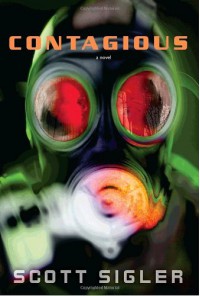 In his follow up to Infected, Scott Sigler takes his tale of alien infection and invasion to a whole new level.
In his follow up to Infected, Scott Sigler takes his tale of alien infection and invasion to a whole new level.The first novel really benefited from the enclosed setting of Perry's apartment, lending his one-man-battle against the triangles a claustrophobic intimacy. In Contagious, we have Perry out in the wild with the rest of the team in a race against time to figure out how to stop the extraterrestrial menace.
The story is a lot of fun. We've got new kinds of infection, military, medical, and political perspectives, and Perry Dawsey looking for payback. There's a lot going on in this book, and I was always on edge, desperate to know the next development, and cheering on our heroes even as they faced seemingly impossible odds. In terms of gore, I didn't find it as gruesome as the previous installment, except for one certain scene involving fingers which I happened to read whilst eating my lunch. I would say the focus here is more on action, and how the US would respond to a potential alien invasion. There's lots of military action, which I thought was well handled without too much lingo, but if you're not a fan of this kind of action then this might not be for you.
The focus shifts around a lot between different viewpoints, both human and alien, as well as the technique used in the first novel of getting right into the human body to see what the virus is doing to it. Whilst I like getting this wide perspective, at times I felt it was too wide, never allowing us to get close enough to the characters or spend long enough in their heads to be able to get to know them. Perry and Dew's developing relationship was great, but again I wish we'd spent more time with them. There's not much to say about the other characters, except that Margo was pretty cool. Actually most of the characters are male, and there was a lot of macho attitude thrown around that could sometimes get on my nerves, and I do wish we'd had a female character in the military or politics who wasn't the rage-inducing Vanessa.
The whole thing was a fun and action-packed read, and I'd recommend it if you enjoyed the first one, or if you're looking for a creative approach to how an alien invasion might look. I wasn't quite expecting the ending, and it left me feeling a bit low, but looking back on it I think it was the perfect way to wrap up the story.
San Diego 2014: The Last Stand of the California Browncoats (Newsflesh Trilogy, #0.6)
 I wanted to love this, I really did. But it just didn't do it for me.
I wanted to love this, I really did. But it just didn't do it for me.The story was just too short for me to feel anything for any of the characters. In fact, I didn't really get a grip on who most of them were. In a novella of this length, I think Grant would have done better to focus on just a few characters rather than a bunch of them spread out over the convention. She has such great ideas for characters, and the setting at Comic-Con provided so many excellent opportunities for nerd-references, but I just feel it was wasted in this format.
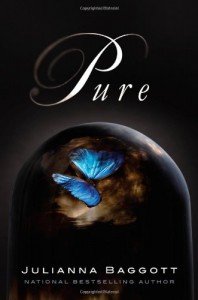 I started out absolutely loving this book. The intricate world-building, beautiful descriptions, and slow build-up that hinted at secrets yet to be uncovered were all right up my street. The descriptions of the macabre fusings were especially fascinating, and appealed to my rather twisted side. I love to be immersed in dark, detailed, worlds and this book offered that up in spades.
I started out absolutely loving this book. The intricate world-building, beautiful descriptions, and slow build-up that hinted at secrets yet to be uncovered were all right up my street. The descriptions of the macabre fusings were especially fascinating, and appealed to my rather twisted side. I love to be immersed in dark, detailed, worlds and this book offered that up in spades.The characters were all generally likable, although I wasn't particularly interested in any of them, except for Bradwell. Pressia is an alright lead, certainly not someone I disliked, but I also never became that emotionally involved. It was mainly the plot and the world that had me hooked.
However, after around the halfway point, it just kind of fell apart for me. I heard that the film rights for the series have already been acquired by FOX, and maybe this had something to do with it, but it just seemed like the author suddenly decided the book needed some big ACTION SCENES and CAR CHASES when there was no real necessity for them. I'd also been enjoying the light touch of teasing hints and snippets of information, only to have a huge info dump fall on my head in the last couple of chapters. Said info of course raised more questions to lead into the sequels, but it also added far too many brand new ideas that hadn't been previously grounded in the story, leading to some confusion on my part.
I enjoyed the world immensely, and I would have been eager to carry on with the series if the first book had gone on as it started. As it is, I might pick the next one up, but it's no longer at the top of my to-read list.
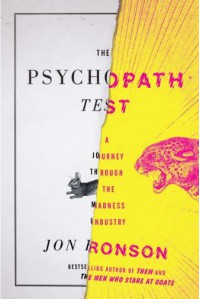 I actually really enjoyed this book. So why only two stars?
I actually really enjoyed this book. So why only two stars?To me, it read more like a series of interesting (and very well written) Wikipedia articles strung together, rather than a cohesive book. The author introduced many interesting ideas and anecdotes, but I found it severely lacking in any analysis or interpretation. I can easily access facts and information online for free - when I buy a book I'm looking for something more, some insight or fresh knowledge I couldn't get anywhere else. I was also let down by the way the author failed to really define the terms he was using, frequently using 'madness', 'psychopathy' and 'mental illness' rather interchangeably. One of the most fascinating aspects of psychopathy is the debate over whether it is an illness, a personality disorder, a personality trait etc., but this was was only touched upon rather than truly explored.
Overall it's a very interesting read, and the author's tone is particularly engaging, but there's nothing here you couldn't find with a quick web search.
Help Yourself Get Everything Done : and Still Have Time to Play
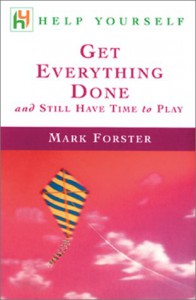 So, I should admit: self-help books are a guilty pleasure of mine. I'm sure there's many psychological explanations for this attraction, but for now let's just say that I enjoy them, and in particular the sub-genre of time-management self-help. I'm pretty craptastic at managing my time and motivating myself, and reading books like this is probably my way of feeling like I'm making progress whilst actually just putting off dealing with the problem.
So, I should admit: self-help books are a guilty pleasure of mine. I'm sure there's many psychological explanations for this attraction, but for now let's just say that I enjoy them, and in particular the sub-genre of time-management self-help. I'm pretty craptastic at managing my time and motivating myself, and reading books like this is probably my way of feeling like I'm making progress whilst actually just putting off dealing with the problem.All that being said, what did I think of this one?
Mark Forster's writing style was nice, not too patronising nor too pushy. The book laid out some concepts that I believe to be key to time-management (or "life-management"), such as saying no to extra commitments, in an approachable way. The 'fairytale' interludes were a nice touch, and I also liked seeing the examples of how Forster manages his own days in the diary section.
What lets this book down is that it doesn't really do what it says on the cover. Forster specifically states that his book is applicable to anyone, yet it is very much skewed towards business folks. Not only that, but it seems geared especially towards management types, or people running their own businesses, with lots of talk about "projects" and "forward thinking" and so on. There are whole chunks of the book that I felt didn't apply to me. The other aspect I felt let down by was that the subtitle of "and still have time to play" never seemed to be fully addressed. Forster seems to work from the assumption that people fundamentally enjoy their work, and there isn't really much about how to get yourself to do certain tasks day after day that you actually don't take much pleasure in. I suppose there are plenty of self-help books directed at people who don't like their work, but my point is that this book is supposed to be geared towards the general masses, especially those just starting out on dealing with their time-management issues, and as such it should have taken a broader perspective.
Overall, I did pick up one or two new ideas that I'll be giving a try, so I definitely don't think this was a wasted read. The problem is that I believe the book has been marketed towards the wrong audience. Forster mentions that his experience is mainly with helping people manage their businesses, and I have the feeling that that is where his strengths really lie.
Children of Winter
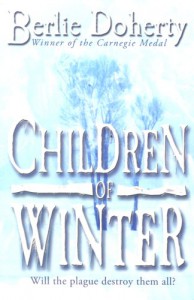 Ever since I was a child I've loved survival stories, and I remember really enjoying this one. On a second reading as an adult I still found it a nice read. The story follows three children in 1666 as they survive a Winter in an old barn where their parents have sent them to avoid the plague ravaging their village. If you're looking for action and lots of things going on then this isn't the book for you. What it does give is a realistic insight into the time and the situation, and with the three children of varying ages you get to experience with them a variety of emotions from childish innocence in Dan, to the worries of Catherine, thrust into adult responsibilities.
Ever since I was a child I've loved survival stories, and I remember really enjoying this one. On a second reading as an adult I still found it a nice read. The story follows three children in 1666 as they survive a Winter in an old barn where their parents have sent them to avoid the plague ravaging their village. If you're looking for action and lots of things going on then this isn't the book for you. What it does give is a realistic insight into the time and the situation, and with the three children of varying ages you get to experience with them a variety of emotions from childish innocence in Dan, to the worries of Catherine, thrust into adult responsibilities. I thought the idea of using a modern family as a link to the corresponding family in 1666 was a neat idea, but that it wasn't utilised to full effect. We only got the first chapter and a very brief final chapter with the 'modern day' Tebbutts, and I think a few more encounters with them would have fleshed out the connections nicely. I also found the ending to be a bit too ambiguous.
There are a few potential issues for younger readers. Firstly, it may be difficult for children unfamiliar with Yorkshire dialects - there's a lot of 'thees' and 'thas' thrown around. Also, when a writer is presenting characters from a different time period it's still important to make them relatable to a modern audience, but with this book being written in the 1980s I feel that it may no longer be successful with that.
On the whole I would recommend it for any kids who are interesting in survival stories or learning a bit about what life was like in the 1600s. It's an easy enough read if they can handle the dialect.
 I really enjoyed the world and plot of the book, it's just a shame it was let down by terrible characterization.
I really enjoyed the world and plot of the book, it's just a shame it was let down by terrible characterization.Most of the characters were just.. there. If you asked me about the protagonist, Deuce, I'd say she was 'a Huntress', since that's the only way she identifies herself, and the reader isn't given much more insight to get to know her. Aguirre seems to be trying to show that she's a kind person inside, but this doesn't really ring true, especially given her instant jealousy of nearly every female character. I found her attitudes towards other women generally distasteful, but other than that there wasn't much to like or dislike about her. Fade seemed even more of a non-character. I get that he's supposed to be all mysterious, but that doesn't mean that his personality has to be hidden in the mists too.
Then there's Stalker. I can enjoy redemption stories. What I can't enjoy is being introduced to a character one minute as a ruthless gang leader who both rapes women himself and encourages it of others, and finds fun in hunting people down as a form of bloodsport - and the next we're meant to admire him for his strength and 'doing what needed to be done', and forgive him of all his past. What's more, Deuce seems to act as though Tegan and Stalker putting the past behind them is on the same level. Like Stalker giving up his leadership is the same as Tegan forgiving him of everything he did to her, either directly or indirectly (because of course Stalker didn't rape Tegan himself, so that's ok, right?). This is the part of the book that made me feel generally icky and uncomfortable. Tegan finally breaks free from years of captivity, beatings, and rape and is then essentially told to just get over it. What's more, we are constantly reminded of how weak she is, and how different to Deuce, and it is made clear that Deuce would never let the same thing happen to her, because she's strong and a Huntress. Deuce's references to Tegan as a Breeder don't even make sense - she wasn't from the Enclave so she didn't grow up with those roles. She didn't train as a warrior, but she also didn't have expectations of breeding. She was a girl who was captured by a group of men bigger and stronger than her, kept as basically a sex slave, and forced to give birth TWICE to children that died (we don't know how). Yet Deuce still implies that Tegan's Breeder nature (i.e. Breeders are weak and emotional) was the reason this happened, and as a Huntress she would have fought to the death. It's this implicit undertone of looking down on women, except of course for Deuce, that really ruined the book for me.
Anyway, rant over, let's move on. The writing reminded me a lot of the Hunger Games as it was very much a case of 'I did this. And then I did this. And then this happened'. This makes it a very easy and fast read, but I don't find it particularly engaging. Actually, I feel like Enclave's plot and world merged with HG's characters would have made a pretty decent novel. The post-apocalyptic concepts were interesting, and the plot progressed at a nice pace. I enjoyed the focus on the survival aspects and the journey, and whilst there were elements of 'romance' and love triangles, they weren't at the forefront.
Overall, I'd say the world of Enclave will stick with me, but the boring characters, uninspired writing, and uncomfortable undertones really let it down.
The Walk
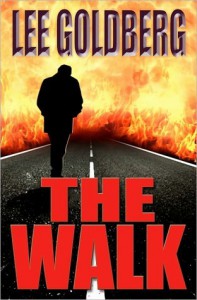 The Walk is an easy-to-read, fast-paced story following one man's journey to get home to his wife after The Big One has obliterated LA. The depictions of a post-disaster metropolis were fantastic, and there was some personal drama woven in with the gradual revelations of Marty's less-than-perfect home life. I actually liked Marty for all his flaws; he was just a guy trying to do what he thought was right. Buck was also a fun character - I did see the twist coming, but that didn't really spoil things.
The Walk is an easy-to-read, fast-paced story following one man's journey to get home to his wife after The Big One has obliterated LA. The depictions of a post-disaster metropolis were fantastic, and there was some personal drama woven in with the gradual revelations of Marty's less-than-perfect home life. I actually liked Marty for all his flaws; he was just a guy trying to do what he thought was right. Buck was also a fun character - I did see the twist coming, but that didn't really spoil things.On the downside, as a Brit who has never visited LA (or America at all), I found myself wading through a lot of descriptions of locations I couldn't relate to, and an awful lot of discussion of specific roads and routes that I feel would only enhance the story for those who are native to the city. There were also a lot of TV references that I didn't really 'get', since I'm afraid my knowledge doesn't go back any further than the mid 90s.
Regarding the ending, I'm still not quite sure if it fit with the story or not. On the one hand, there was so many self-aware references to Hollywood and TV cliches that I expected the ending to turn its back on this kind of thing completely. On the other hand, maybe having a perfect movie-style ending is the ultimate expression of self-awareness? I'm still undecided, but it did wrap things up in a nice, tidy, feel-good manner.
I'd recommend it to anyone who enjoys disaster stories, or has an interest in the television industry - and it's ideal if you love both!
 Half realistic survival guide (with a zombie twist), half fictional accounts of zombie outbreaks, this book is a mixed bag.
Half realistic survival guide (with a zombie twist), half fictional accounts of zombie outbreaks, this book is a mixed bag.For someone already as paranoid as myself, it's fairly depressing to have it hammered home just how much in the way of resources you need to truly be prepared for the end of the world. Just bear that in mind before you pick this book up if you have a tendency to fret over whether or not your basement of canned food will be enough to see you through - it won't. The survival section is definitely aimed at those zombie fans who, however much they may laugh it off when ribbed about it, deep down have a genuine fear of an undead uprising. Whilst I found a lot of useful survival info here, it did get a little dry in terms of reading material.
The latter section, accounting for around one quarter of the book, is an interesting and extremely realistic account of various 'recorded attacks' throughout history, dating all the way from 60,000BC to 2002AD. Brooks touches on so many unique situations and strategies to whuch you wish he had devoted more than half or one page tidbits - which is when you close the book and reach over for World War Z: An Oral History of the Zombie War. It can be read as an introduction to the detail and realism that Brooks would perfect in this later work.
Overall, a good addition to any die-hard zombie fan's bookshelf, but not for those looking for either blood & guts type action, or a spoof.
 Some interesting themes about what makes someone a bad person, but ultimately let down by clumsy writing and a long build-up with little pay-off.
Some interesting themes about what makes someone a bad person, but ultimately let down by clumsy writing and a long build-up with little pay-off.
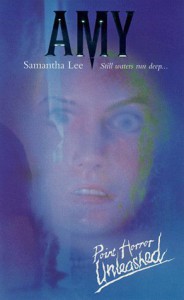 Fun little mystery/ghost story, let down by bad writing. Probably 1 star for an adult reader, but 3 for a younger teen.
Fun little mystery/ghost story, let down by bad writing. Probably 1 star for an adult reader, but 3 for a younger teen.
Feed (Newsflesh Trilogy #1)
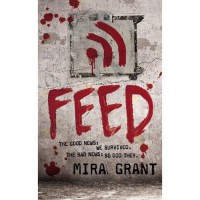 (I wrote this review right after finishing the book, but never posted it. Thought it was about time that I did, since I'm just starting on the final installment of the trilogy.)
(I wrote this review right after finishing the book, but never posted it. Thought it was about time that I did, since I'm just starting on the final installment of the trilogy.)First off, I loved this book.
MAJOR SPOILORS AHEAD
Everyone knows that zombies are a great background against which to examine various social issues of the moment. I was slightly sceptical of the theme of blogging – was the author going to take a painfully simplistic approach or, even worse, use the fact that the characters are bloggers to excuse shoddy writing? I was, however, in for a wonderful surprise. Yes, blogging is a key part of the plot, but it’s not arbitrary, and it makes sense.
The technical descriptions of the virus, the technology that developed after the Rising, and the mechanisms of blogging are all well thought out and explained, which is one of the book's great strengths. If I’m going to believe in this world, it’s these kinds of details that do it. There are plenty of zombie stories that are just mindless action – this is not one of them. The details of the Rising, and humanities response to it, are thoughtful, well described and, most importantly, believable.
I also really liked the narrator, George. Yes she’s dry, grumpy, and a little cynical, and maybe it says a lot about me that I really identified with her. I like that she gets her job done. She’s sensible and pragmatic, but she’s also not an emotionless robot. I didn’t actually realise how attached I had got to the character, until the bombshell near the end. I also liked the supporting characters, mainly Buffy. And the relationship between Shaun and George has hints of something deeper than just sibling-like love, which I'm hoping isn't just me reading too much into things.
Knowing that this novel was the first in a trilogy, I felt safe in the knowledge that I would be following George and Shaun in their adventure at least into the second volume. How wrong I was. It’s a risky move for an author to kill off her lead character and switch narrative voices before the first novel in a trilogy is even over. I am wary of what the next book will be like with Shaun narrating, but I did enjoy his part following George’s death. I will readily admit, I cried like a baby during her death scene, right up until the final page, and even for a while after. I don’t know how it packed such an emotional punch – maybe because I was caught up in the realism, and had really got emotionally attached to the characters – but it did.
I am greatly anticipating the second novel, although I am slightly wary. What will having Shaun as a narrator be like? Will the series be the same without George? Will I ever be able to learn more about her and Shaun’s relationship? Whatever the answers, you can be sure that I will be reading it.
Japan Before Perry: A Short History
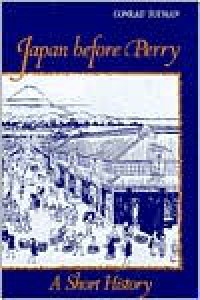 I thought this was a great book for a brief introduction to pre-modern Japan. It gives an overall idea of the historical events and cultural themes of the eras, enabling the reader to decide on areas for further research. It is by no means a comprehensive study, but as it says on the cover this is a 'short history' that is perfect for anyone wishing to break into the fascinating, but sometimes intimidating, subject of Japanese history.
I thought this was a great book for a brief introduction to pre-modern Japan. It gives an overall idea of the historical events and cultural themes of the eras, enabling the reader to decide on areas for further research. It is by no means a comprehensive study, but as it says on the cover this is a 'short history' that is perfect for anyone wishing to break into the fascinating, but sometimes intimidating, subject of Japanese history.
 1
1




